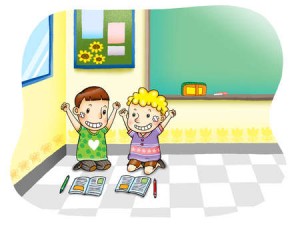School Success for Children with Traumatic Brain Injuries
Children who suffer a traumatic brain injury (TBI) typically face a long road to recovery. They may not only have problems with speech and language, but also with attention, memory, and problem-solving. A speech-language pathologist (SLP) can help your child with many of the issues that he faces, but remember that a child’s brain is still developing. He could experience new or changing symptoms months or years after the trauma occurred.
Keep a journal of your child’s symptoms and how they evolve. As your child prepares to return to school, work closely with his teachers and the school administrators to ensure his academic success. It can be particularly helpful for your child’s SLP to meet with his teachers to discuss possible modifications to the curriculum or to the classroom itself.
Modifications to Teaching Methods
Children with a TBI often have shortened attention spans. They are easily distracted. The child might benefit from having a prearranged signal between him and the teacher that reminds the child to return to the discussion or to a task. For example, the teacher could tap her wristwatch to remind the child that it is time to get back to work. This same signal could also be used to signal the start of an assignment. Many children with a TBI have difficulty beginning a task.
Your child might also have problems understanding abstract language, such as hyperbole, joking, or sarcasm. The teacher could modify her speech and use concrete language. Shorter, direct sentences are helpful. If your child struggles with changes in routine, the teacher could prepare him by clearly announcing that the class is to stop taking notes and begin silent reading, for example. The child may also require more time to answer a question. When the teacher calls on him to answer a question, she could provide more time than usual, as well as write the question on the chalkboard for a visual aid.
Modifications to Assignments
Your child might also require abbreviated assignments and tests. He might require more time to complete an assignment. He might need assistance with note-taking. You may also notice that your child has trouble with writing assignments. His writing might appear directionless, for example. He might benefit from outlines or notecards. As well, memory can be a factor. Children who often forget assignments and deadlines will need frequent reminders, both verbal and written.
Physical Modifications
Children who are easily distracted can benefit from a change in seating. The teacher can move the child so that he is seated closest to the chalkboard or away from other pupils who frequently distract him. When it is time to take a test, your child might require a separate, quieter area in which to concentrate.
Children who have suffered a traumatic brain injury often require both verbal and written cues. For example, a child who frequently ignores classroom rules may simply be forgetting them. Remind the child verbally that he needs to raise his hand to speak, for example, as well as providing him with a written copy of the rules. If he struggles with written language, he might benefit from simple drawings to remind him, like an image of a child raising his hand while seated at a desk. Visual organizers can greatly help children who have difficulties with information processing.
Tutors and Aides
The school might provide your child with a tutor or a one-on-one aide in the classroom. In some cases, the teacher might assign a mature student to act as a peer companion. The peer companion could help your child by reminding him of the rules and providing a model of behavior. The peer model could also encourage social interaction and communication during appropriate times throughout the school day.





